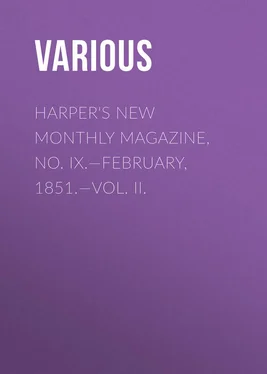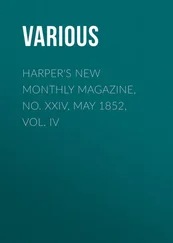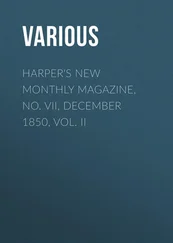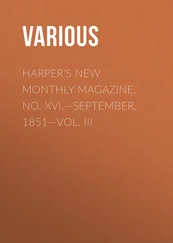Various - Harper's New Monthly Magazine, No. IX.—February, 1851.—Vol. II.
Здесь есть возможность читать онлайн «Various - Harper's New Monthly Magazine, No. IX.—February, 1851.—Vol. II.» — ознакомительный отрывок электронной книги совершенно бесплатно, а после прочтения отрывка купить полную версию. В некоторых случаях можно слушать аудио, скачать через торрент в формате fb2 и присутствует краткое содержание. Издательство: Иностранный паблик, Жанр: periodic, foreign_edu, на английском языке. Описание произведения, (предисловие) а так же отзывы посетителей доступны на портале библиотеки ЛибКат.
- Название:Harper's New Monthly Magazine, No. IX.—February, 1851.—Vol. II.
- Автор:
- Издательство:Иностранный паблик
- Жанр:
- Год:неизвестен
- ISBN:нет данных
- Рейтинг книги:4 / 5. Голосов: 1
-
Избранное:Добавить в избранное
- Отзывы:
-
Ваша оценка:
- 80
- 1
- 2
- 3
- 4
- 5
Harper's New Monthly Magazine, No. IX.—February, 1851.—Vol. II.: краткое содержание, описание и аннотация
Предлагаем к чтению аннотацию, описание, краткое содержание или предисловие (зависит от того, что написал сам автор книги «Harper's New Monthly Magazine, No. IX.—February, 1851.—Vol. II.»). Если вы не нашли необходимую информацию о книге — напишите в комментариях, мы постараемся отыскать её.
Harper's New Monthly Magazine, No. IX.—February, 1851.—Vol. II. — читать онлайн ознакомительный отрывок
Ниже представлен текст книги, разбитый по страницам. Система сохранения места последней прочитанной страницы, позволяет с удобством читать онлайн бесплатно книгу «Harper's New Monthly Magazine, No. IX.—February, 1851.—Vol. II.», без необходимости каждый раз заново искать на чём Вы остановились. Поставьте закладку, и сможете в любой момент перейти на страницу, на которой закончили чтение.
Интервал:
Закладка:
Where rougher climes a nobler race display —
Where the bleak Swiss their stormy mansions tread,
And force a churlish soil for scanty bread.
No product here the barren hills afford
But man and steel, the soldier and his sword,
No vernal blooms their torpid rocks array,
But winter lingering chills the lap of May;
No zephyr fondly sues the mountain's breast,
But meteors glare, and stormy glooms invest.
Yet still, even here, content can spread a charm,
Redress the clime, and all its rage disarm.
Though poor the peasant's hut, his feasts though small,
He sees his little lot, the lot of all;
Sees no contiguous palace rear its head,
To shame the meanness of his humble shed —
No costly lord the sumptuous banquet deal,
To make him loathe his vegetable meal —
But calm, and bred in ignorance and toil,
Each wish contracting, fits him to the soil,
Cheerful at morn, he wakes from short repose,
Breasts the keen air, and carols as he goes;
With patient angle trolls the finny deep,
Or drives his venturous plowshare to the steep,
Or seeks the den where snow-tracks mark the way,
And drags the struggling savage into day.
At night returning, every labor sped,
He sits him down the monarch of a shed;
Smiles by his cheerful fire, and round surveys
His children's looks, that brighten at the blaze —
While his lov'd partner, boastful of her hoard,
Displays her cleanly platter on the board:
And haply too some pilgrim, thither led,
With many a tale repays the nightly bed.
Thus every good his native wilds impart
Imprints the patriot passion on his heart;
And even those ills, that round his mansion rise
Enhance the bliss his scanty fund supplies:
Dear is that shed to which his soul conforms,
And dear that hill which lifts him to the storms
And as a child, when scaring sounds molest,
Clings close and closer to the mother's breast —
So the loud torrent and the whirlwind's roar
But bind him to his native mountains more.
Such are the charms to barren states assign'd —
Their wants but few, their wishes all confin'd;
Yet let them only share the praises due,
If few their wants, their pleasures are but few:
For every want that stimulates the breast
Becomes a source of pleasure when redress'd.
Whence from such lands each pleasing science flies,
That first excites desire, and then supplies.
Unknown to them, when sensual pleasures cloy,
To fill the languid pause with finer joy;
Unknown those powers that raise the soul to flame,
Catch every nerve and vibrate through the frame:
Their level life is but a smouldering fire,
Unquench'd by want, unfann'd by strong desire,
Unfit for raptures, or, if raptures cheer
On some high festival of once a year,
In wild excess the vulgar breast takes fire,
Till, buried in debauch, the bliss expire.
But not their joys alone thus coarsely flow —
Their morals, like their pleasures, are but low;
For, as refinement stops, from sire to son
Unalter'd, unimprov'd the manners run —
And love's and friendship's finely pointed dart
Fall blunted from each indurated heart.
Some sterner virtues o'er the mountain's breast
May sit, like falcons cowering on the nest;
But all the gentler morals, such as play
Through life's more cultur'd walks, and charm the way —
These, far dispers'd, on timorous pinions fly,
To sport and flutter in a kinder sky.
To kinder skies, where gentler manners reign,
I turn; and France displays her bright domain.
Gay, sprightly land of mirth and social ease,
Pleas'd with thyself, whom all the world can please;
How often have I led thy sportive choir,
With tuneless pipe, beside the murmuring Loire,
Where shading elms along the margin grew,
And, freshen'd from the wave, the zephyr flew!
And haply, though my harsh touch, faltering still,
But mock'd all tune, and marr'd the dancer's skill —
Yet would the village praise my wondrous power,
And dance, forgetful of the noontide hour.
Alike all ages: dames of ancient days
Have led their children through the mirthful maze;
And the gay grandsire, skill'd in gestic lore,
Has frisk'd beneath the burden of three-score.
So bless'd a life these thoughtless realms display;
Thus idly busy rolls their world away.
Theirs are those arts that mind to mind endear,
For honor forms the social temper here:
Honor, that praise which real merit gains,
Or even imaginary worth obtains,
Here passes current – paid from hand to hand,
It shifts, in splendid traffic, round the land;
From courts to camps, to cottages it strays,
And all are taught an avarice of praise —
They please, are pleas'd, they give to get esteem.
Till, seeming bless'd, they grow to what they seem.
But while this softer art their bliss supplies,
It gives their follies also room to rise;
For praise, too dearly lov'd, or warmly sought,
Enfeebles all internal strength of thought —
And the weak soul, within itself unbless'd,
Leans for all pleasure on another's breast.
Hence ostentation here, with tawdry art,
Pants for the vulgar praise which fools impart;
Here vanity assumes her pert grimace,
And trims her robes of frieze with copper lace;
Here beggar pride defrauds her daily cheer,
To boast one splendid banquet once a year:
The mind still turns where shifting fashion draws,
Nor weighs the solid worth of self-applause.
To men of other minds my fancy flies,
Embosom'd in the deep where Holland lies.
Methinks her patient sons before me stand,
Where the broad ocean leans against the land;
And, sedulous to stop the coming tide,
Lift the tall rampire's artificial pride.
Onward, methinks, and diligently slow,
The firm, connected bulwark seems to grow,
Spreads its long arms amid the watery roar,
Scoops out an empire, and usurps the shore —
While the pent ocean, rising o'er the pile,
Sees an amphibious world beneath him smile;
The slow canal, the yellow-blossom'd vale,
The willow-tufted bank, the gliding sail,
The crowded mart, the cultivated plain —
A new creation rescued from his reign.
Thus, while around the wave-subjected soil
Impels the native to repeated toil,
Industrious habits in each bosom reign,
And industry begets a love of gain.
Hence all the good from opulence that springs,
With all those ills superfluous treasure brings,
Are here display'd. Their much lov'd wealth imparts
Convenience, plenty, elegance, and arts;
But view them closer, craft and fraud appear —
Even liberty itself is barter'd here.
At gold's superior charms all freedom flies;
The needy sell it, and the rich man buys:
A land of tyrants, and a den of slaves,
Here wretches seek dishonorable graves;
And, calmly bent, to servitude conform,
Dull as their lakes that slumber in the storm.
Heavens! how unlike their Belgic sires of old —
Rough, poor, content, ungovernably bold,
War in each breast, and freedom on each brow;
How much unlike the sons of Britain now!
Fir'd at the sound, my genius spreads her wing.
And flies where Britain courts the western spring;
Where lawns extend that scorn Arcadian pride,
And brighter streams than fam'd Hydaspes glide.
There, all around, the gentlest breezes stray;
There gentle music melts on every spray;
Creation's mildest charms are there combin'd:
Extremes are only in the master's mind.
Stern o'er each bosom reason holds her state
With daring aims irregularly great.
Pride in their port, defiance in their eye,
I see the lords of human kind pass by,
Intent on high designs – a thoughtful band,
By forms unfashion'd, fresh from Nature's hand,
Fierce in their native hardiness of soul,
True to imagin'd right, above control;
While even the peasant boasts these rights to scan
And learns to venerate himself as man.
Thine, freedom, thine the blessings pictur'd here.
Thine are those charms that dazzle and endear;
Too bless'd indeed were such without alloy,
But, foster'd even by freedom, ills annoy.
That independence Britons prize too high
Keeps man from man, and breaks the social tie:
The self-dependent lordlings stand alone —
All claims that bind and sweeten life unknown.
Here, by the bonds of nature feebly held,
Minds combat minds, repelling and repell'd,
Ferments arise, imprison'd factions roar,
Repress'd ambition struggles round her shore —
Till, overwrought, the general system feels
Its motions stopp'd, or frenzy fire the wheels.
Nor this the worst. As nature's ties decay,
As duty, love, and honor fail to sway,
Fictitious bonds, the bonds of wealth and law,
Still gather strength, and force unwilling awe.
Hence all obedience bows to these alone,
And talent sinks, and merit weeps unknown;
Till time may come when, stripp'd of all her charms,
The land of scholars, and the nurse of arms —
Where noble stems transmit the patriot flame,
Where kings have toil'd, and poets wrote for fame —
One sink of level avarice shall lie,
And scholars, soldiers, kings, unhonor'd die.
Yet think not, thus when freedom's ills I state,
I mean to flatter kings or court the great.
Ye powers of truth, that bid my soul aspire,
Far from my bosom drive the low desire!
And thou, fair freedom, taught alike to feel
The rabble's rage, and tyrant's angry steel —
Thou transitory flower, alike undone
By proud contempt or favor's fostering sun —
Still may thy blooms the changeful clime endure!
I only would repress them to secure;
For just experience tells, in every soil,
That those who think must govern those that toil —
And all that freedom's highest aims can reach
Is but to lay proportion'd loads on each.
Hence, should one order disproportion'd grow,
Its double weight must ruin all below.
Oh, then, how blind to all that truth requires,
Who think it freedom when a part aspires!
Calm is my soul, nor apt to rise in arms,
Except when fast approaching danger warms;
But, when contending chiefs blockade the throne,
Contracting regal power to stretch their own —
When I behold a factious band agree
To call it freedom when themselves are free —
Each wanton judge new penal statutes draw,
Law grinds the poor, and rich men rule the law —
The wealth of climes, where savage nations roam,
Pillag'd from slaves to purchase slaves at home —
Fear, pity, justice, indignation start,
Tear off reserve, and bare my swelling heart:
Till half a patriot, half a coward grown,
I fly from petty tyrants to the throne.
Yes, brother! curse with me that baleful hour
When first ambition struck at regal power;
And thus, polluting honor in its source,
Gave wealth to sway the mind with double force.
Have we not seen, round Britain's peopled shore,
Her useful sons exchang'd for useless ore?
Seen all her triumphs but destruction haste,
Like flaring tapers brightening as they waste?
Seen opulence, her grandeur to maintain,
Lead stern depopulation in her train —
And over fields where scatter'd hamlets rose,
In barren, solitary pomp repose?
Have we not seen, at pleasure's lordly call,
The smiling, long frequented village fall?
Beheld the duteous son, the sire decay'd,
The modest matron, and the blushing maid,
Forc'd from their homes, a melancholy train,
To traverse climes beyond the western main —
Where wild Oswego spreads her swamps around,
And Níagara stuns with thundering sound?
Even now, perhaps, as there some pilgrim strays
Through tangled forests, and through dangerous ways,
Where beasts with man divided empire claim,
And the brown Indian marks with murderous aim —
There, while above the giddy tempest flies,
And all around distressful yells arise —
The pensive exile, bending with his woe,
To stop too fearful and too faint to go.
Casts a long look where England's glories shine
And bids his bosom sympathize with mine.
Vain, very vain, my weary search to find
That bliss which only centres in the mind.
Why have I stray'd from pleasure and repose,
To seek a good each government bestows?
In every government, though terrors reign,
Though tyrant-kings or tyrant-laws restrain,
How small, of all that human hearts endure,
That part which laws or kings can cause or cure?
Still to ourselves in every place consign'd,
Our own felicity we make or find.
With secret course, which no loud storms annoy,
Glides the smooth current of domestic joy;
The lifted ax, the agonizing wheel,
Zeck's iron crown, and Damiens' bed of steel —
To men remote from power but rarely known —
Leave reason, faith, and conscience, all our own.
Читать дальше
Интервал:
Закладка:
Похожие книги на «Harper's New Monthly Magazine, No. IX.—February, 1851.—Vol. II.»
Представляем Вашему вниманию похожие книги на «Harper's New Monthly Magazine, No. IX.—February, 1851.—Vol. II.» списком для выбора. Мы отобрали схожую по названию и смыслу литературу в надежде предоставить читателям больше вариантов отыскать новые, интересные, ещё непрочитанные произведения.
Обсуждение, отзывы о книге «Harper's New Monthly Magazine, No. IX.—February, 1851.—Vol. II.» и просто собственные мнения читателей. Оставьте ваши комментарии, напишите, что Вы думаете о произведении, его смысле или главных героях. Укажите что конкретно понравилось, а что нет, и почему Вы так считаете.












